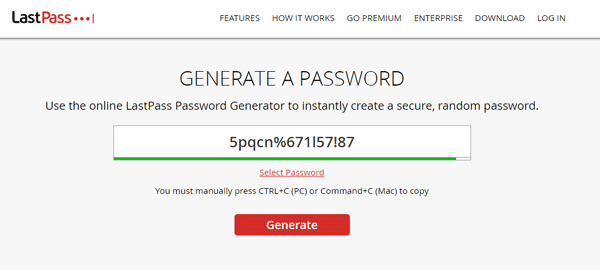

To avoid letting that requirement shrink your password pool, set the password length high. Using all character sets is a necessity for many websites. But some password generators force selection of at least one from each type of character, and that shaves down the possibilities drastically.our 40 million possibilities dwindle to 1,209,600. “There are 40,960,000 possible four-character passwords, drawing from a collection of 80 characters. The shorter your password, the fewer options possible: As PCMag continues in their blog linked above, some generators are set to use all character types available: uppercase, lowercase, numbers, and symbols. It may have unseen settings that make the generated password significantly less random than it appears.


#Secure password generator generator
Another reason for extra length in randomly generated passwords? You don’t know how the generator is set up to work. LastPass opens the generator with the length set to 20, but 16 characters is a good bet-for passphrases, this comes out to 3 or 4 words unless you’re going for a Scrabble high score. Like with most professionally recommended minimums, you probably want to go higher. Take the LastPass generator, for example: Hopefully this goes without saying, but don’t use the “easy to say” setting or anything else that cuts down your character pool.Įxperts often recommend an 8-character password at a minimum. Granted, using a password manager in the first place means you can make intense passwords without having to worry about remembering them. You can choose length, character type, and whether you want it to be fairly memorable or readable. Password generators give you a lot of options before spitting out a string of characters. You could also create your own random password generator if you’re skeptical of Internet security standards and have the time to do so. You pull it up, disconnect from the Internet, do your thing, and clear your cache before reconnecting.
#Secure password generator Offline
There are also offline password generators out there, like this one. While we don’t normally advise believing any random technical mumbo jumbo descriptors you see, let us just say that secure password managers use the latter, while an SSL-less website with a name like “SUPER SECURE PASSWORD GENERATOR” likely does not. And you probably didn’t check if the website in question is using a regular pseudo-random number generator or a cryptographically secure pseudo-random number generator. You don’t know if they’re keeping your data and storing passwords in a very hackable HQ server. For basic cybersecurity reasons, you don’t know the website and who might be monitoring it on the sly. If you’re using a random site that popped up in your first Google results, we advise that you run. If the seed was a 32-bit integer, that means the algorithm would run through 4,294,967,295 other numbers before a repeat.”– PCMag Which Password Generators Are Secure? The original seed never turns up again until every other number has come up. The algorithm processes the seed and gets a new number with no traceable connection to the old, and the new number becomes the next seed. This algorithm starts with a number called a seed. “Password managers and other computer programs use what's called a pseudo-random algorithm. All results seem randomized, but they actually aren’t. Computers can’t actually be random-they need a seed number to kickstart the algorithm. Why are password generators only pseudo-random? Because they use algorithms. Secure password generators, like those connected to password managers, use cryptographically secure pseudo-random number generators or have offline functionality so that you can generate passwords to your heart's content without the risk of anyone sneaking a look through your Internet connection. So when it comes to the question of using any old online password generator, our immediate gut reaction is a resounding “NO!” However, not all password generators are secure. None of us should reuse passwords, and what we tend to come up with off the top of our heads isn’t as hack-proof as we’d like to think. Password generators are a fantastic tool.


 0 kommentar(er)
0 kommentar(er)
